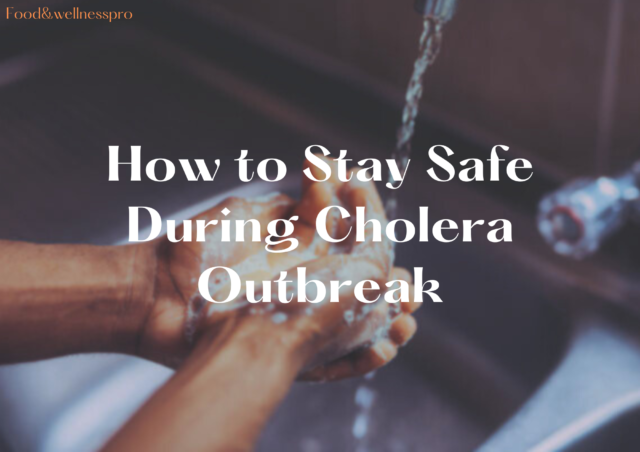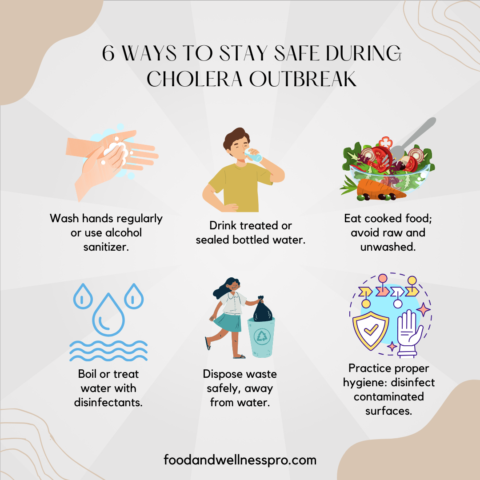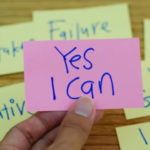
When there is an outbreak of disease, staying unaffected can be as simple as taking the right precautions. You know you need to practice good hygiene, but you might not be sure exactly what steps to take to avoid contracting and transmitting the disease.
In this blog post, we’ll cover everything you need to know to protect yourself and your loved ones during cholera outbreak in your community.
What is Cholera and Why is it Dangerous?
Cholera is an acute diarrheal infection that spreads through eating food or drinking water contaminated with the bacterium Vibrio cholerae.
During an outbreak, cholera can spread rapidly in areas with poor sanitation, congestion, and lack of clean drinking water.
Each year, the number of cholera cases worldwide falls within the range of 1.3 million to 4 million, resulting in 21,000 to 143,000 deaths around the world yearly, according to estimates by researchers.
Cholera can be deadly if not treated, especially in severe cases, due to the rapid loss of enormous amounts of fluids and electrolytes. In critical situations, if the infected person does not receive adequate treatment, such a person can die from dehydration and shock within hours to days after the cholera symptoms appear.
Cholera can sometimes show no symptoms. However, around 10% of people who get infected develop serious symptoms within 12 hours to five days after ingestion of the cholera bacteria. Some common symptoms of cholera are:
1. Watery diarrhoea – Diarrhoea, or extremely watery stool, is one of the most common symptoms. It is sometimes described as ‘rice-water stools’ because it often has a pale, milky appearance that resembles water in which rice has been rinsed. Cholera-related diarrhoea comes on suddenly and can lead to an excessive loss of fluid in the body.

2 Nausea and vomiting – This symptom occurs in the early stage of cholera. The ingested bacteria cause gastrointestinal irritation, leading to vomiting that can last for hours. When accompanied by diarrhoea, it increases the risk of dehydration.
3 Dehydration – The extreme loss of fluids from diarrhoea and vomiting can rapidly lead to dehydration and electrolyte imbalances. Some signs of dehydration are; thirst, dry mouth and eyes, mild muscle cramps, tiredness and headaches.
4 Rapid heart rate – In most cases, this occurs as a later symptom if severe dehydration remains untreated. Dehydration causes the heart to work harder to pump diminishing fluids, resulting in a rapid heartbeat.
Around 5 out of every 100 infected persons will have severe cholera symptoms. All cases of cholera should be treated earnestly, if proper medical attention is delayed or inadequate, the infected person may die from dehydration and circulatory shutdown may take place shortly after.
Common Source of Cholera Infection
1. Drinking water contaminated with Vibrio cholerae bacteria may come from untreated sewage entering water sources due to poor sanitation and waste management.
2. Food contaminated during or after preparation. This can happen if the food is cooked with contaminated water or handled by individuals who do not practice proper hygiene.
3. Seafood especially shellfish, can harbor cholera bacteria if taken from contaminated waters. Eating raw or insufficiently cooked seafood from such areas potentially increases the risk of infection.
4. Fruit and vegetables can become contaminated if irrigated or washed with contaminated water. Consuming raw produce that has been exposed to cholera bacteria poses a health risk.
How is Cholera Transmitted?
Cholera can be transmitted through ingestion of water or food contaminated by the faeces (poop) of an infected person.
The cholera bacteria is passed through human waste and can spread rapidly in areas with poor hygiene and lack of clean water.
When people eat food or drink water that has come into contact with contaminated faeces, they can become infected. In areas with poor hygiene, a single infected person can contaminate the water supply for thousands of people.
Practising proper hygiene and being mindful of the safety of what you consume will help you stay safe and less susceptible to contracting cholera.
6 Ways to Stay Safe from Cholera

1. Avoid untreated water and prioritize water safety by drinking properly treated or sealed bottled water. Ensure this water safety also applies to the water you use for washing dishes, brushing your teeth, and cooking.
2. Practice food safety by consuming properly cooked food avoiding raw seafood and unwashed fruits or street snacks, and prioritize packaged, freshly prepared foods.
3. Cultivate proper hygiene by washing hands frequently with soap and clean water, particularly before eating or after using the bathroom. In a case where clean water and soap aren’t available use a hand sanitizer containing at least 60% alcohol.
4. Disinfect your water by boiling it for at least one minute, or use chlorine tablet or add iodine drops.
5. Adopt proper waste management by disposing of waste safely and away from water sources.
6. Take extra preventive care when around cholera patients by washing your hands, bathing, and washing your clothes properly after contact. Additionally, disinfect contaminated surfaces regularly.
Poor environmental hygiene, unsafe drinking water, unclean toilets, open defecation, and poor hand hygiene are risk factors for contracting and spreading cholera,”
stated Eze, who is also the Chief Executive Officer of TalkHealth9ja.
How Do We Protect Ourselves from Cholera?
Staying safe from cholera can be as simple as prioritizing clean water usage, safe food, and practising good hygiene.
Always drink treated water and eat well-cooked food. Wash your hands always before ingesting anything into your mouth, especially after using the bathroom and before meals. Keep your surroundings clean and use clean toilets.
Some time ago I visited a rural area where cholera was a concern. The resident taught me to always carry a small bottle of hand sanitizer and to be cautious about where I ate.
They also showed me how they used chlorine tablets to treat their drinking water. Adopting these simple habits made a big difference in staying healthy.
Is Cholera Contagious?
Cholera is a highly contagious and deadly disease. Cholera, a bacterial infection, spreads through various means, specifically water and food because these are essential for survival. If food or water is contaminated by faeces from an infected person, anyone who consumes it is at risk.
In the case of direct person-to-person transmission, this usually happens in congested areas where people practice poor hygiene and sanitation. When an infected person with cholera comes into contact with another person through shaking hands or sharing utensils, the bacteria can be transferred in such scenarios.
Consequently, to prevent the spread of cholera, good hygiene must be practised, including regular hand washing, improving sanitation facilities, and educating people on food and water safety. Quick response to detect and treat cases is also crucial in controlling cholera outbreak.

Oluwatumininu Adeyi is a wellness enthusiast, writer and SEO Consultant living in Nigeria. She loves many things including reading, learning new ways to nurture her mind and body, exploring natural remedies, and spending time outdoors in nature. She uses her skills to craft compelling content that engages audiences and drives visibility in search engines.



